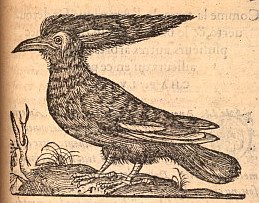


[The above images are from Cosmographie de Levant - 1553 - a compendium of facts about the people, places, flora and fauna of Italy and the Mediterranean region]



 "Andre Thevet first used the name 'Toucan' with a long description, and a woodcut of a whole bird, in his "Singularitez de la France". The Latin name "Burhynchus" or "Ramphestes" (in reference to the size of the beak) was suggested by Conrad Gesner ("Icones Avium", 1560, p.130), and Linnaeus later adopted Aldrovandus' corrupted form of the latter ("Ramphastos"), which is how the family.." name came into being (the family name survives for some species but toucans are spread across a number of families these days).
"Andre Thevet first used the name 'Toucan' with a long description, and a woodcut of a whole bird, in his "Singularitez de la France". The Latin name "Burhynchus" or "Ramphestes" (in reference to the size of the beak) was suggested by Conrad Gesner ("Icones Avium", 1560, p.130), and Linnaeus later adopted Aldrovandus' corrupted form of the latter ("Ramphastos"), which is how the family.." name came into being (the family name survives for some species but toucans are spread across a number of families these days).
[The above images are from Singularitez de la France Antarctique, Autrement Nommee Amerique, & de Plusieurs Terres & Isles Decouvertes de Nostre Temps - 1557 - this book is a description of the New World essentially]
Franciscan monk André Thevet (?1515-1590) "was one of the most widely travelled Frenchmen of the 16th century visiting almost all the main countries and regions of western Europe, the Near East, and Brazil."
The publishing history of André Thevet is reflective, as with the toucan story above, of the 'borrowing' that went on between authors and illustrators of renaissance books. After Singularitez was released, one of the transcribers sued Thevet claiming authorship and the dispute was settled, lending credence to the wide-held belief that Thevet was not responsible for much of the work issued in his name. A later collaborator on Thevet's large work, Cosmographie Universelle (1771), again had a dispute with Thevet and went off and published his own version (well, more a translation of Münster's Cosmographia) and Thevet alleged plagiarism. I'm leaving out many details but the accusations and theft seem to travel a circular route.
Scholars now apparently feel that Thevet's contributions on Brazil are worthy historical commentaries but much of his other writing on the Americas was probably obtained by speaking with such luminary explorers as Sebastian Cabot and Jacques Cartier, among others. But it was only relatively recently that the North American sections were translated into english.
Thevet claimed to have introduced tobacco plant seeds to France and he may have introduced the pineapple to Europe. But then again, I'm not sure what to believe about this character after reading a lot of confusing material.
Images from Singularitez are taken from Gesner's Historiae Animalium (1555); images from Gesner are taken from Cosmographie; both heavily relied on Münster and his natural historian antecedents and many later naturalist/explorer/authors abstracted elements from all these sources. So it goes..
- Cosmographie de Levant and Singularitez de la France Antarctique are online among the Douglas Gordon Collection at the University of Virginia.
- Commentary on Thevet from U. Virginia.
- Short review of a 1986 book on Thevet.
- Tupinamba -v- Staden.
- Topsell/Rowland - 'The Beasts Rise'.
- Early history of tobacco.
No comments:
Post a Comment